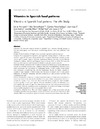Identificador persistente para citar o vincular este elemento:
https://accedacris.ulpgc.es/jspui/handle/10553/74286
| Título: | Vitamins in Spanish food patterns | Otros títulos: | Vitamins in Spanish food patterns: The eVe study | Autores/as: | Aranceta, Javier Serra-Majem, Lluis Pérez-Rodrigo, Carmen Llopis, Juan Mataix, José Ribas, Lourdes Tojo, Rafael Tur, Josep A. |
Clasificación UNESCO: | 3206 Ciencias de la nutrición | Palabras clave: | Nutrition Survey Recommended Intakes Inadequate Intake Food Patterns Cross-Sectional Studies, et al. |
Fecha de publicación: | 2001 | Publicación seriada: | Public Health Nutrition | Conferencia: | 4th Congress of the Spanish-Society-of-Community-Nutrition (SENC)/3rd International Workshop of Community Nutrition | Resumen: | Objective: To describe vitamin intakes in Spanish food patterns, identify groups at risk for inadequacy and determine conditioning factors that may influence this situation.Design: Pooled-analysis of eight cross-sectional regional nutrition surveys.Subjects: Ten thousand two hundred and eight free-living subjects (4728 men, 5480 women) aged 25-60 years. Respondents of population nutritional surveys carried out in eight Spanish regions (Alicante, Andalucia, Balearic Islands, Canary Islands, Catalunya, Galicia, Madrid and Basque Country) from 1990 to 1998. The samples were pooled together and weighted to build a national random sample.Methods: Dietary assessment by means of repeated 24-hour recall using photograph models to estimate portion size. Adjusted data for intra-individual variation were used to estimate the prevalence of inadequate intake. A Diet Quality Score (DQS) was computed considering the risk for inadequate intake for folate, vitamin C, vitamin A and vitamin E. DQS scores vary between 0 (good) and 4 (very poor). Influence of lifestyle (smoking, alcohol consumption and physical activity) was considered as well.Results: Inadequate intakes (<2/3 Recommended Dietary Intake) were estimated in more than 10% of the sample for riboflavin (in men), folate (in women), vitamin C, vitamin A, vitamin D and vitamin E. More than 35% of the sample had diets classified as poor quality or very poor quality. Factors identified to have an influence on a poor-quality diet were old age. low education level and low socio-economical level. I A sedentary lifestyle, smoking, usual consumption of alcohol and being overweight were conditioning factors for a poor-quality diet as well.Conclusion: Results from The eVe Study suggest that a high proportion of the Spanish population has inadequate intakes for at least one nutrient and nearly 50% should adjust their usual food pattern towards a more nutrient-dense, healthier diet. | URI: | https://accedacris.ulpgc.es/handle/10553/74286 | ISSN: | 1368-9800 | DOI: | 10.1079/PHN2001209 | Fuente: | Public Health Nutrition [ISSN 1368-9800], v. 4 (6A), p. 1317-1323, (Diciembre 2001) |
| Colección: | Actas de congresos |
Citas SCOPUSTM
48
actualizado el 08-jun-2025
Citas de WEB OF SCIENCETM
Citations
104
actualizado el 15-feb-2026
Visitas
68
actualizado el 10-feb-2024
Descargas
147
actualizado el 10-feb-2024
Google ScholarTM
Verifica
Altmetric
Comparte
Exporta metadatos
Los elementos en ULPGC accedaCRIS están protegidos por derechos de autor con todos los derechos reservados, a menos que se indique lo contrario.
